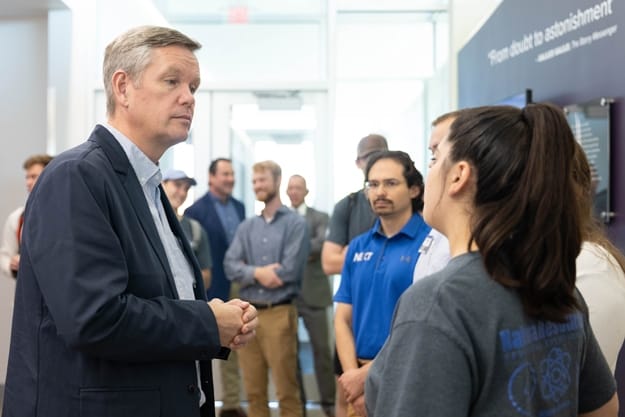Enlarge

Research at Abilene Christian University’s Nuclear Energy eXperimental Testing Laboratory (NEXT Lab) – sponsored by Natura Resources – has led to the approval of a third patent as the team works toward designing and building the first university-based Molten Salt Research Reactor.
This month, the U.S. Patent and Trademark office will officially award ACU the patent for “identifying and quantifying components in a high-melting-point liquid,” after a five-year process of researching, developing and testing the idea and applying for the patent. The technology is critical to the Molten Salt Reactor research of NEXT Lab.
“In order for a molten salt reactor to operate safely and effectively, the operators need to have a clear understanding of the chemical composition of the salt in the reactor,” said Dr. Kim Pamplin, professor in the Department of Chemistry and Biochemistry and director of chemistry for NEXT Lab. “Specifically, we need to know and minimize the amount of oxygen in the salt, to avoid corrosion when the hot salt is in contact with metal.”
Enlarge

Existing technology was designed for room temperature water rather than high-temperature liquid salt. One method of examining the liquid is to remove it from the reactor, freeze it and then dissolve it in water, which can then be tested, but that method is time consuming. After attending a conference at Oak Ridge National Laboratory in 2018, Pamplin realized the need for a better and more efficient process. He began sketching diagrams of what might work and collaborating with undergraduate student researchers at ACU. In the summer of 2019, he and Tyler Cepica, then a junior biochemistry major, landed on the components that led to a patentable idea – taking the liquid salt and turning it into an aerosol that can be funneled into a machine to analyze its composition instantly, providing real-time assessment.
The official co-inventors are Pamplin and Cepica, but Alli Mae Berry, then a senior chemistry major and now a full-time research scientist at NEXT Lab, was also heavily involved in the research, and several other students also took part. In addition to the chemistry research experience, the students learned about the patent process and the importance of documenting and protecting their ideas and their work. Several additional NEXT Lab patents are in the provisional stage, and through the Natura Resources Research Alliance, there are more than 30 ideas at various stages of the patent application.
Natura Resources, the sponsor of NEXT Lab’s work, is committed to answering the world’s increased demand for reliable energy, medical isotopes and clean water by developing commercially deployable molten salt reactors and has brought together Abilene Christian University, Texas A&M University, The University of Texas at Austin, and The Georgia Institute of Technology to form the Natura Resources Research Alliance, a revolutionary partnership between public and private universities and private industry.
About NEXT Lab
The mission of ACU’s NEXT Lab is to provide global solutions to the world’s need for energy, water and medical isotopes by advancing the technology of Molten Salt Reactors while educating future leaders in nuclear science and engineering. NEXT Lab is advancing the use of molten salt, rather than water, as a coolant for nuclear reactors with the goal of designing and building the first university-based Molten Salt Research Reactor. Students work alongside faculty seeking creative solutions to complex problems, gaining real-world experience and seeing firsthand how innovation and collaboration can impact the world. NEXT Lab, powered by Natura Resources, provides extraordinary opportunities through ACU’s departments of engineering and physics, chemistry and biochemistry, and others. NEXT Lab employs more than 75 people, including 45 undergraduate students.
— Wendy Kilmer
March 4, 2024
